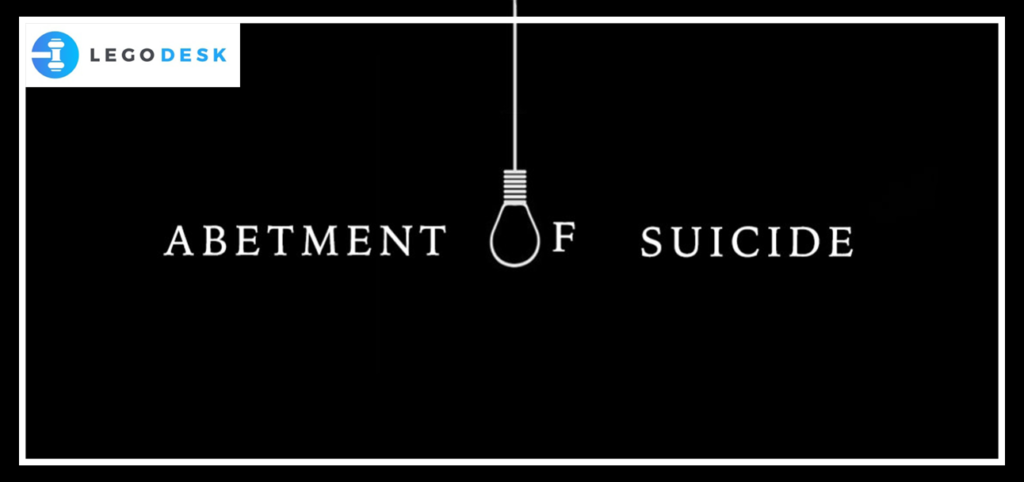Section 306 IPC Abetment of Suicide
Scope of Section 306 of IPC
In India, suicide is not an offence while attempt to suicide is a punishable offence under Section 309 of IPC and so is Abetment of Suicide as mentioned under Section 306 of IPC. In this article, we will be emphasizing on Section 306 of the Indian Penal Code. It states that any person who abets or assists a person in the commission of suicide shall be punished with imprisonment for a term which may extend up to 10 years and shall also be liable to fine[1]. Section 306 is often read with section 107 which describes the term “Abetment”.
Meaning of “Abetment”:
A person abets the commission of activity when:
- He/ She instigates any person to do a thing;
- He/ She engages with 1 or more persons in any conspiracy for the doing of that thing or if an act or illegal act takes place in pursuance of the conspiracy; and
- He/ She intentionally aides the doing of that thing by any act or illegal omission.
Here the 1st clause of section 107 refers to a person who by willful misrepresentation or by willful concealment of material fact which he is supposed to disclose voluntarily causes or procures a thing to be done is said to instigate the doing of the thing.
The 2nd and the 3rd clause of the section in simple words signify that any person either prior to or at the time of the commission of an act does anything to facilitate the commission of the act is said to aid the doing of the act. The offence of Abetment of Suicide is a non-bailable and cognizable offence which can be tried by the Court of Session.
The conditions mentioned for this offence seem a little vague and are prone to misuse so there have been various cases which have time and again amended the provisions and laid down guidelines for the application of this section. Here are a few landmark judgments to further illustrate in Section 306.
Important Case Laws in Section 306:
1.) Chitresh Kumar Chopra v State( Govt. of NCT of Delhi):
In this case, the Court dealt with the meaning of the term “instigation” and “goading”. The Court gave its opinion that the mala fide intention to provoke, incite or encourage the commission of an act by a person is mandatory. Each person’s suicidality pattern is different from others thus, it is not possible to lay down a straight-jacket formula while dealing such cases.[2] Each case must be decided on the basis of its own facts and circumstances. The intention of the Legislature and the ratio of the case decided by the Court gave a clear indication that in order to convict a person under Section 306 IPC, mens rea is an indispensable ingredient. It also requires the act to play an active part in pushing the deceased into such a position that he sees no option other than suicide.
2. ) State of West Bengal v Orilal Jaiswal & Another[3]:
The Court gave out a caution that all Courts should be meticulous while assessing the facts and circumstances of the cases and also the evidence adduced in the trail for finding whether cruelty meted out to the victim persuaded one to end one’s life by committing suicide. If the Court finds out that the victim committing suicide was hypersensitive to the petulance and difference in domestic life an individual is ordinarily exposed to, the Court would not be satisfied for basing a finding that the accused should be held guilty.
3.) Ramesh Kumar v State of Chattisgarh[4]:
In this case, in a dispute between the husband and wife, the husband uttered to the wife, “You are free to do whatever you wish and go wherever you like”. As a result of this statement, the wife committed suicide. The Court interpreted the term “instigation “ again and declared that in order to satisfy the requirement of instigation, though the actual words must be used for such a consequence, yet a reasonable certainty to incite the consequence must be capable of being spelt out. A word uttered out of anger or emotion cannot be termed as “instigation”.
4.) Manikandan v State:
This has proved to be an imperative judgment in the history of landmark judgments. The Madras High Court held that merely being named in a Suicide Note does not invoke Section 306 IPC. The contents of the note need proper scrutinization to find out whether the accused falls within the ambit of abetment as mentioned under section 306. The Court further declared that “it is not the wish and willingness nor the desire of the victim to die, it must be the wish of the accused, it is the intention on the part of the accused that the victim should die that matters much. There must be a positive act on the part of the accused.”[5]
Conclusion
We thus see that this particular Section of IPC is quite sensitive and has to be used responsibly. The cases portray the intricacies involved in such penal provisions which can be misappropriated in the absence of stern directions from the Court. The decision of a weak-minded or a woman of frail mentality should not be misunderstood as abetment. Sometimes the victim might take the decision of committing suicide unaccompanied by any act or instigation. Thus it would not be fair to blame another person for such foolishness.
[1] Indian Penal Code, s 306
[2] Chitresh Kumar Chopra v State(Government of NCT of Delhi) [2009] 16 SCC 605
[3] [1994] 1 SCC 73
[4] [2001] 9 SCC 618
[5] Manikandan v State [2016] SC 316
Try our Debt Resolution solutions today Request a Demo
